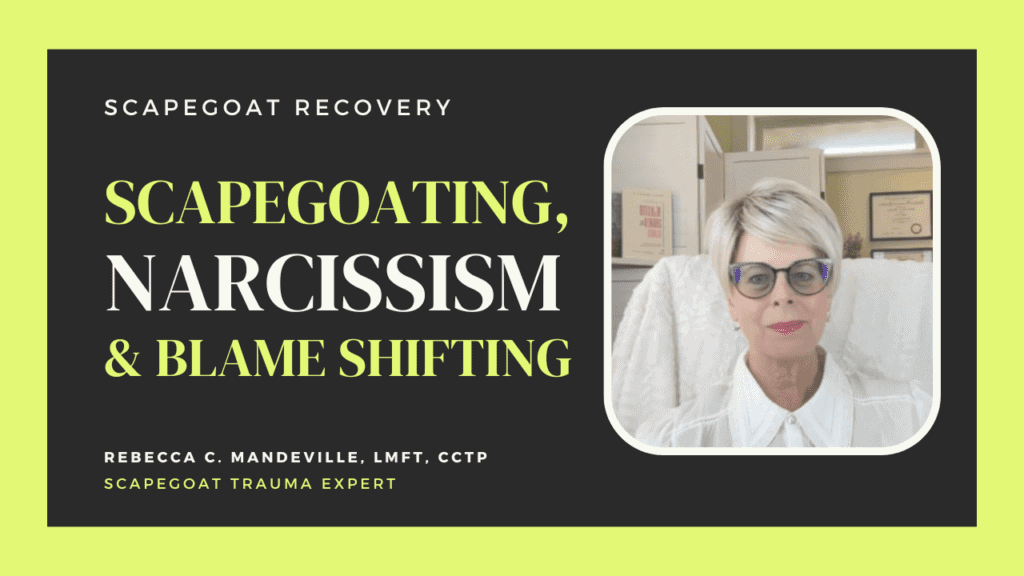What is ‘reactive abuse’ and how does this relate to family scapegoating abuse (FSA)?
I want to start off first by saying I don’t like the term ‘reactive abuse’ but if you were to do a Google search, that’s the term that’s used, should you want to learn more about it. I myself would call the phenomenon I will be describing in this article ‘reactive survival defense mechanisms’.

If you prefer to listen to my discussion on reactive abuse, you can watch my video here.
Reactive abuse is when someone who is a victim of abuse (family scapegoating abuse, in this case) reacts to the abuse in such a manner that if an outside person were to be a fly on the wall observing, it would make it look like they, and not the perpetrator, are the abuser.
Specifically: When someone’s been subjected to family scapegoating abuse over a period of time – sometimes a very long period of time – there’s a point where they can just break and then engage in behaviors that to any objective person are going to look like abusive behaviors.
Such behaviors can include yelling, slamming doors, throwing things, punching, hitting, cussing at someone, calling someone names. This is because the fight or flight trauma responses – and the adrenaline running through the body once you hit your limit – can spontaneously occur if the abused person can’t get away. Alternatively, the victim of FSA may be trauma bonded to their abuser and they don’t even realize getting away is an option.
Reactive abuse can work against the victim because the abuser – and often it will be a narcissist that’s associated with reactive abuse – can then point the finger and say, “Look! Look at how they treat me! They’re crazy!” or “They’re the angry one, they’re messed up! I’m their victim!”
Reactive Abuse As Blame-Shifting and Gaslighting
Reactive abuse is a close relative of the term Dr Jennifer Freyd created, the acronym ‘DARVO’: Deny, Attack, Reverse Victim and Offender. Through reactive abuse, the offender (the person committing the abusive acts) can look like the victim because the person on the receiving end of the abuse finally loses control and reacts in an aggressive manner toward the abuser. Reactive abuse is similar to DARVO in that it is a form of blame shifting. The perpetrator of the abuse can shame and blame the person who’s the actual victim via their manipulative actions; their ability to ‘turn the tables’ on the person they are abusing.
Reactive abuse is also a form of gaslighting. It’s a way of further distorting and manipulating reality, and that’s something narcissists are really good at. If the scapegoated family member is very vulnerable, they may actually believe this idea that they’re “the problem” or they’re “the crazy one”, especially (again) if there’s trauma bonding going on with a parent or a strong family power holder.
The abusive, scapegoating family member will minimize their abusive behaviors while simultaneously amping up and magnifying the frankly understandable behaviors of the victim who may have finally been pushed to the edge and lost control of themselves. They will then have it brought to their attention many a time by the actual abuser: “Oh, well, you punched me that day; Oh, you know you yelled at me, you called me those names; Well you slammed the door on me. you hung up on me.” Similar to DARVO, there’s no context. There is no accountability. Important information is being deliberately left out.
Recognizing Reactive Abuse
So how do you know if you are a victim of reactive abuse? Well, some things to notice are feeling that rush of adrenaline that will often precede reactive abuse. You might feel like you’re going into a fight or flight response. You may notice a sense of confusion or dissociation, including after the event.
One of the most confusing parts could be that suddenly the person who’s been narcissistically abusing you or scapegoating you is somehow now your victim. You might notice the abuser documenting your behaviors. I’ve seen cases where the abuser wants to videotape it or record the reactive behaviors of their victim or otherwise turn it into Some Big Thing.
They may push you so that you have an outburst in a public setting. Sometimes it might not go so far as reactive abuse, so to speak, but you may get pushed and poked and prodded and provoked until you’re feeling ‘crazy’, angry, or extremely frustrated; or you’re feeling ‘frozen’ and numb; or you’re hysterically sobbing on the floor.
I’ve had clients who are very, very successful, competent people from all walks of life (it doesn’t matter their age, they can be in their 40s, 50s, 60s); stable people, confident people in most ways, but they can be in their family of origin home for all of five or ten minutes and they share with me that they feel like a mess. They are either yelling or screaming or crying within the first few hours of their visit.
So you’ll want to look closely at whether or not this could be happening to you in your family if you identify as being in the ‘family scapegoat‘ role. I’ve had to gently warn some of my clients – especially those who hold licenses, who work in the health field and are practicing doctors or therapists or what have you – because they’re being assaulted. They’re being physically assaulted in some cases by family members – siblings, especially. And anyone can get pushed to a point whereby they might fight back when those survival defense mechanisms kick in. If the police come, they better hope they’re believed or their license and their ability to practice could be gone pretty darn quick.
“Am I the Abusive One?”
An important question I am often asked about reactive abuse from scapegoated adults is, “Does this make me the abuser?” And the answer is a clear NO. Engaging in these types of aggressive, reactive behaviors does not make you ‘the abuser’. What’s actually going on is you are trying to survive. These aggressive, reactive behaviors are directly associated with one’s brain chemistry and the types of nervous system reactions/responses that go along with complex trauma (C-PTSD).
If you are caught in this pattern of reactive abuse, you’ll know it’s reactive abuse because you don’t behave this way with anyone else except when you’re around the people abusing you. The problem is you may not understand you’re being abused. What’s actually happening is you’re being manipulated into losing your cool, so to speak, so that you look like the abusive one and you’re being set up by your abuser.


Comments are public – Please do not leave sensitive or identifying information.